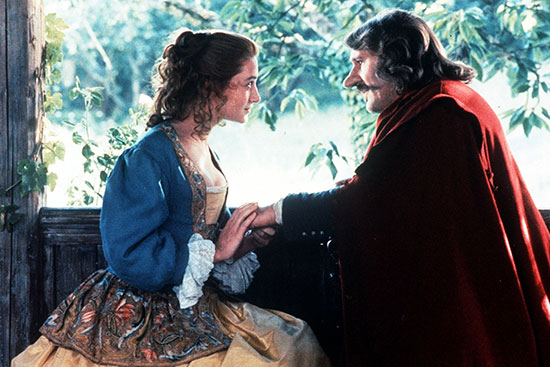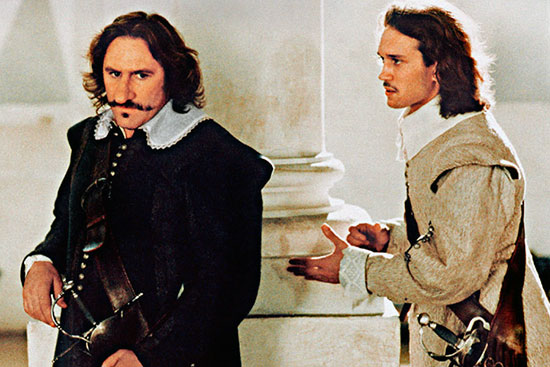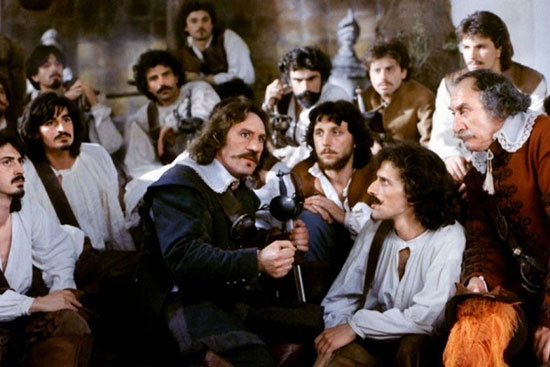Last Updated on February 25, 2022
Loosely based on the life of 17th-century novelist Savinien de Cyrano de Bergerac, Cyrano de Bergerac, by the French playwright Edmond Rostand, remains one of the most enduring romantic stories of all times. His heartbreaking chronicle of unrequited love has made its central hero, the poet and soldier with the prominent nose, immortal.

To help keep this site running: Willow and Thatch may receive a commission when you click on any of the links on our site and make a purchase after doing so.
Over the last 100 years, the narrative has often been brought to both stage and screen, and 2022 sees an inspired re-imagining of the timeless tale from director Joe Wright (Pride and Prejudice, Anna Karenina).
One film adaptation stands out among them all: the 1990 movie directed by Jean-Paul Rappeneau and starring Gérard Depardieu.
Andreina Romero and Gabriela Mörken-Romero, hosts of the podcast Wigs and Candles, review classic and more recent period films, focusing in particular on the way period dramas provide a lens to explore the past and the lives of women through different historical times. In the second of a series of articles for Willow and Thatch, they review “Cyrano de Bergerac” (1990).
Set in 1640, “Cyrano de Bergerac” tells the tragic love story of highly-skilled and respected Gascon soldier Cyrano de Bergerac.
Cyrano has a pure poet’s soul, a heart full of love, and a protrusive nose. The last of these characteristics makes him unattractive to the women around him, including his beautiful cousin Roxane.
By now the plot of Cyrano de Bergerac is well-known: Cyrano loves his cousin Roxane (Anne Brochet), but Roxane has fallen in love with a young cadet in Cyrano’s regiment, Christian de Neuvillette (Vincent Pérez). Roxane asks Cyrano to watch over Christian, which Cyrano agrees to reluctantly. Christian confesses to Cyrano that he has also fallen in love with Roxane. Cyrano devises a plan to “speak for” Christian, who is terminally shy when talking to women, and woo Roxane.
In the process, the love-drunk Cyrano composes some of his most accomplished poetry, which Roxane passionately reads imagining it comes from the handsome Christian.

This classic of French literature is not only special for the originality of the story but also because the text is written entirely in alexandrines, a 12-syllable rhyming verse type that becomes melodious when spoken. Jean-Paul Rappeneau’s adapted script, which he wrote with novelist Jean-Claude Carrière, maintains the original verse. The cast – most impressively Gérard Depardieu as Cyrano– rose to this extraordinary challenge with true virtuosity.
Plays turned into movies always risk feeling static or unable to leave the confines of the stage behind. Not so with Rappeneau’s “Cyrano,” which is full of dynamism and inspired camera movements that mirror the text itself. Every sentence, swing of the sword, and swift of the cape are choreographed to flawlessly follow the rhythm of the alexandrines.
Among the most unforgettable triumphs of this movie is Gérard Depardieu’s turn as the ultimate romantic hero. The performance catapulted him to stardom outside France and marked him as an actor so deeply that for years he struggled to put aside the “Cyrano” in his other roles.
While Depardieu’s extraordinary performance could have easily eclipsed the others, as Roxane and Christian, Anne Brochet and Vincent Pérez hold their own against Depardieu’s tour de force. In addition to fully embodying a passionate heroine in love, Anne Brochet’s Roxanne is full of a powerful self-determination and intellect—her intense love of Christian’s (Cyrano’s) poetry is a sign of her elegance, refinement, but, most of all, her intelligence.
For his part, Vincent Pérez as Christian de Neuvillette perfectly embodies the role of the handsome counterpart to the unattractive Cyrano. He may play the pretty face of the story, but adds depth, magnetism, and intensity to what can be a thankless character obscured by the enormous shadow of Cyrano’s words.

The naturalistic 17th-century settings, both indoors and outdoors, as well as the carefully constructed costumes by Franca Squarciapino, add immensely to the pleasure of the film. The men’s period attire is gorgeously eye-catching, a wonderful portrayal of a time when capes, hats, and feathers adorned soldiers, actors, and poets alike
When Roxane tells Cyrano that she loves Christian, he replies “Tous les mots sont fins quand la mustache est fine”: All words are beautiful when the mustache is fine.
It is a pointed comment on the almost universal human weakness for beauty over deeper attributes or deeds. But what Cyrano ironically forgets is that Roxane, and in great part Christian as well, have much more to offer to the world than their external beauty, something he learns much later in the film when both have the chance to show their kindness, noble spirits, and bravery.
Like its three central characters, this drama is much more than the sum of its parts: it is a classic period film that brings an unforgettable love story to vibrant life on the screen. It is also an ode to French culture and its devotion to everything that is beautiful and refined.
Ultimately, it is a movie about the eternal power of words—the power of art—to transform the heart, the soul, and the mind.
Listen to the full Wigs and Candles podcast on “Cyrano de Bergerac” here.
“Cyrano de Bergerac” (1990) is AVAILABLE on DVD
Rated PG
Wigs and Candles, launched in 2021, is a podcast about two sisters and their obsession with period film. Andreina Romero is a freelance writer and researcher whose work focuses on the importance of the arts in life. She also reviews books, music, and films in local publications and her personal blog. Gabriela Mörken-Romero leads people in a multinational company with a passion for art history, historical fiction, and world museums. Originally from Venezuela, Andreina and Gabriela host their podcast from Canada and Germany respectively.
If you enjoyed this post, wander over to The Period Films List. You’ll especially like the Best Period Dramas:Tudor and Stuart Eras List.

